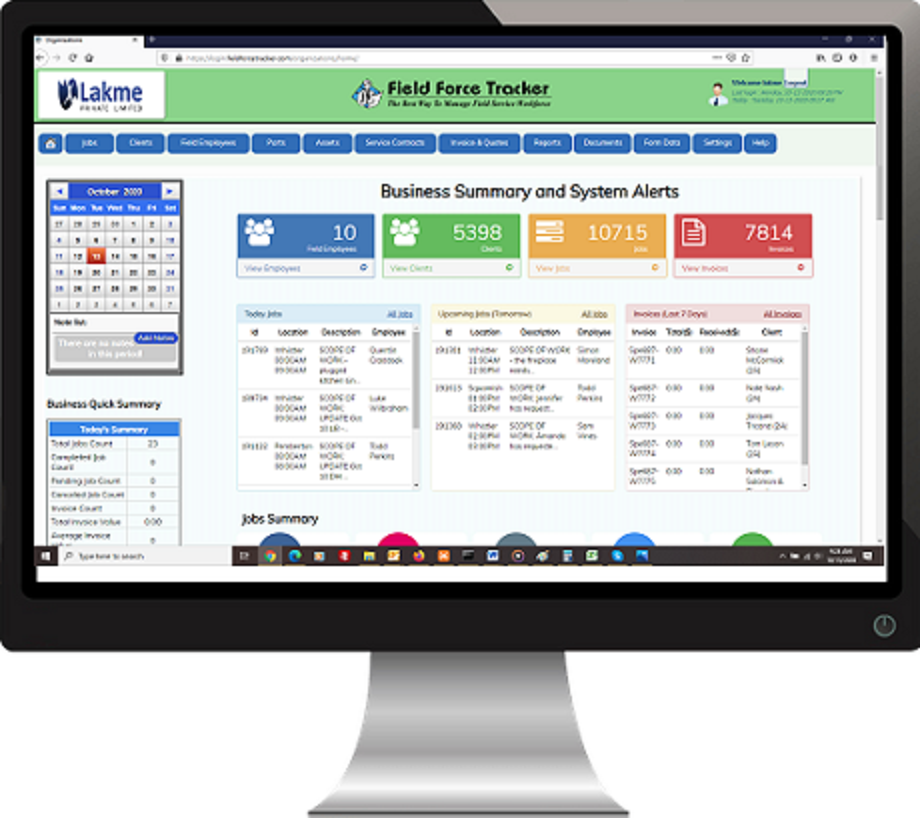This article explains many commonly asked questions about the field service management.
1. What is Field Service Management?
Field service management refers to the management of a company’s resources employed at or en route to the property of clients, rather than on company property. Examples include locating vehicles, managing worker activity, scheduling and dispatching work, ensuring driver safety, and integrating the management of such activities with inventory, billing, accounting and other back-office systems. FSM most commonly refers to companies who need to manage installation, service, or repairs of systems or equipment. It can also refer to software and cloud-based platforms that aid in field service management.

2. What are the components of field service management?
Field service management typically involves dispatching workers or contractors to a location outside company premises to install, maintain or repair equipment, systems or assets. Field service managers keep track of an organization’s field resources and coordinate the work of field service practitioners who deliver skilled, specialized or proprietary services to clients.
3. What are Field service management activities?
Field service scheduling is the process of arranging employee schedules, service appointments and expected work order completion timelines.
Field service dispatch management is the process of coordinating dispatch, which is when a field service technician or specialist is sent out on a work assignment.
Work order management is the process of assigning and tracking service work orders from creation through completion to customer invoicing.
Inventory management is the process of keeping track of parts and supplies, including the transfer of products, consumption, adjustments and more.
Field service contract management is the process of managing contracts with your customers and ensuring service level agreements (SLAs) are met.
What Are the Benefits of field service management Software?
Effective field service management solutions integrate data from enterprise asset management systems with remote data from the field — including IoT and mobile devices — to help a company manage its resources.
Benefits of field service management include:
Increasing uptime: Identify necessary repairs earlier in the asset lifecycle for always-on operations, high levels of performance and reduced downtime.
Shortening mean time to repair and improving first-time fix rates: Ensure the right technician is assigned to the job and provide them with the right data at the right time on a single platform.
Empowering field service technicians: Provide technicians with remote assistance and mobile capabilities that help them to stay safe, be compliant, troubleshoot and complete work tasks efficiently.
Reducing field service costs: Use data and insights to complete maintenance tasks at the right time and in the most effective and efficient manner.
Increasing customer satisfaction: Know if technicians are meeting customer expectations and respond promptly to concerns or unexpected delays.
4. What Are Challenges of field service management?
Maintenance technician leaders are facing many challenges, including attracting and retaining talent amid a shrinking talent pool, under skilled workforce, growing operational costs and a lack of technology to manage complex assets and expanding service needs. The key to managing these challenges is employing software that can automate certain tasks to reduce the strain on your workforce, improve knowledge transfer and provide capabilities that support technicians in the field.
Mobile service technicians face challenges such as scheduling conflicts, the ability to obtain essential data, miscommunication about job tasks, and having to make return trips. To overcome these challenges, more main system CMMS capabilities must be available on phones and tablets, including the ability to review asset maintenance histories, access detailed technical specifications and GIS-location data, examine work order information, process billing, and communicate in real time.
Finally, many companies have implemented several separate solutions over time and now have multiple tools that don’t work together. For field service management to run smoothly, it’s critical to have cohesive, integrated, end-to-end solutions that are easy for field teams to use and provide dashboards that offer enterprise-wide visibility of a company’s resources.
5. What is field service management software?
Field service management software helps businesses manage all the resources involved in field service management activities. It can help managers and technicians process job orders, automate scheduling and dispatch, keep track of service and repair tasks, manage customer service contracts, collect payment and more.
Field service management capabilities are provided by a variety of software and solutions.
6. What is Mobile field service management software?
The cloud and mobile capabilities offered by some field service management software provide access to real-time communications and keep technicians connected to important information and support while in the field. With mobile capabilities, field service technicians can capture images on their devices and access data from remote assets and digital twins to evaluate the root causes of issues. They can also extend collaboration with AI and AR capabilities that are becoming more standard.
7. What is Enterprise asset management software?
Enterprise asset management (EAM) software helps companies maintain and control their operational assets and equipment, both off and on premises. By centralizing asset information and implementing AI-powered remote monitoring and analytics, maintenance managers can maximize asset utilization, increase productive uptime and reduce operational costs.
8. What is Inventory management system?
An inventory management system helps companies optimize their maintenance, repair and operations (MRO) inventory. It can provide an accurate, granular view of MRO inventory performance while delivering optimized recommendations for inventory and reorder levels for each stocked item.
9. What are Field service management industry applications?
Manufacturing
Technicians are typically dispatched for preventative or predictive maintenance and repair of equipment under warranty within various sectors such as automotive, aerospace, defense, electronics, industrial products, consumer products and more.
Transportation
Service technicians must have access to details about assets and inventory, including fuel management, driver logs, spare parts, bay schedules and other data critical to maintaining rail, road and air traffic operations.
Energy and utilities
Technicians must consider geospatial information from remote assets while accommodating complex crew scheduling for high volume and time-sensitive work orders.
Oil and gas
In these industries, the emphasis is on safety, reliability, compliance and performance. Companies can reduce costs by standardizing and streamlining field service maintenance practices.
10. What is the future of field service management?
As assets grow in complexity, the way businesses manage their field service operations must evolve. The future of field service management will be about empowering the connected technician — any asset, anytime, anywhere, on any cloud.
Field service technicians will use solutions that provide significant insights from IoT devices into how and when equipment should be serviced. They will increase their productivity through automation, mobile capabilities and AI support. With access to digital services in the cloud, customers will also have a better experience.
In the future, these technologies will continue to transform field service management.
Field service automation
AI-informed automated schedule optimization will help dispatchers perform better troubleshooting and improve field resource quality and productivity.
AI in field service management
As technology evolves, AI will augment the skills and training requirements of technicians while leveraging the ability to analyze endless tomes of new and historical data.
IoT field service
Predictive maintenance based on data obtained from Internet of Things (IoT) devices and augmented reality (AR) powered troubleshooting will make it possible to limit maintenance on equipment and assets.
Cloud field service management
Hybrid cloud will enable integrated and infinitely scalable operations platforms that connect data and knowledge across an organization, their partnerships and customers.
Explore 3 key features your technicians need to get the job done
11. What do you use for field service management?
The future of field service management
Field service automation. AI-informed automated schedule optimization will help dispatchers perform better troubleshooting and improve field resource quality and productivity.
AI in field service management.
IoT field service. ..
Cloud field service management.
What do you need from field service management software?
For dispatchers and owners, this includes:
Automated scheduling and dispatch
Intelligent scheduling recommendations
Easy customer and job creation
Smart notifications, including delays and ETAs
Job status monitoring on scheduler plus the Live Map feature
Proof of service data
Customer experience reviews
12. What is Field Service Management (FSM)?
The research report “Field Service Management (FSM) Solution Market” includes qualitative and quantitative insights into the major drivers, restraints, opportunities, and challenges impacting worldwide market growth. The analysis contains detailed …
13. What’s important in the field service industry?
Field service management must meet certain requirements: Customer expectations: Customers expect that their service should not be disrupted, and should be immediately restored Underutilized equipment: Expensive industrial equipment in mining or oil and gas can cost millions when sitting idle Low employee productivity: Managers are unable to monitor field employees, which may reduce productivity More items…
14. What is the best field service management software?
Field Force Tracker is an FSM tool designed for large and enterprise-level businesses that offer field service. Available features include automated routing and workflow automation. .
15. What to Consider When Reviewing FSM Options?
Check the number of good quality companies that are already using the software and how long the company has been in the business?
What is the definition of field service?
Field service is the process of managing your assets and resources that are deployed at customer, public and third-party locations. This may also include managing assets in transport and providing services at customer locations. The following are illustrative examples of field service.
16. What does a field service representative do?
A field service representative working for phone companies, medical suppliers, and power companies generally provides light customer service and education, but her duties are usually more technical. These representatives are typically testing new products or services, fixing problems with current products, or consulting field engineers in order to find new ways of making things run more.
17. Who uses Field Service Software?
Field service software is used by all kind of businesses – like HVAC Service Business, plumbing service company, electrical contractors, elevators service companies, cleaning, industrial repairs, telecom, It equipment repair business etc.



